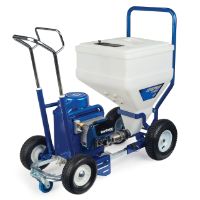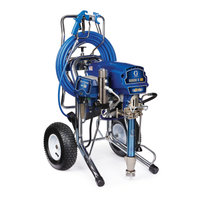Choosing the Right Texture Sprayer
Learn What Questions To Ask To Make the Right Choice
Whether you are adding spray equipment to your fleet, replacing old equipment or are a first-time buyer, the equipment decision you make is critical to your bottom line. Get the right equipment and your profit grows. Get the wrong equipment and you leave money on the table.
How can you make the correct decision and select the right equipment? The answer lies not only in identifying and understanding job requirements, but also in identifying future needs and goals.
Lets explore 8 basic questions you will want to answer to help you choose the right equipment and hopefully put more money in your pocket!
1. Which Materials Do You Apply?
- Do you spray waterborne materials only?
⁃ Do you spray oil-based materials?
⁃ Do you use high viscosity materials?
⁃ Does the material contain aggregates? How big are the aggregate particles?
⁃ Does the material require high or low atomizing pressure?
⁃ How fast does the material set-up and dry?
⁃ What mil thickness are you trying to achieve?
As you can see, these are some very basic material questions. The answers are going to begin to steer you to the appropriate solution required to get the job done. Keep in mind that this should not only include the materials you apply today, but should also include materials that you may be apply in the future. This is important to remember when you are considering expanding your business to new applications with different materials.
2. How Many Litres Are Being Applied?
Properly sizing equipment to the job is the key to productivity. Knowing how many litres you will spray throughout the year, factored with desired production rate, will help to get you on the right track.
A common mistake is to undersize equipment. Typically, this is the result of not wanting to spend more when acquiring equipment. Results of undersized equipment include poor production rate as well as unwanted component failure and work stoppage. Undersizing can be a “penny wise, pound foolish” mistake.
There tends to be less downside to oversizing equipment, aside from higher acquisition and parts costs. In general, larger equipment tends to last longer and can also be more productive and forgiving with materials. Having extra capability can be key to future growth and opportunity down the road.
3. What Type Of Power Is Available At The Job Site?
Utilising the most reliable, most convenient and cost effective power source is the key to continued productivity. Fortunately, most equipment solutions are available in various “flavours” including petrol-powered, electric 120V and 240V and air-powered solutions. In fact, some equipment is convertible from gas to electric for ultimate versatility.
Generally speaking, outside work typically utilises petrol-powered solutions. Petrol offers ultimate freedom and versatility with no power cable. When running sprayers from trailer or truck, or on sites with no power, you are left with little option. One big advantage of petrol-powered equipment is their performance, which is generally higher than electric powered units and at a lower comparable cost. The downside to petrol-powered sprayers includes exhaust emissions, noise, heat, fuel requirement and periodic engine maintenance.
Inside work typically is completed with electric units due to zero-emissions and also because of abundant free electricity. Besides running quiet, they also offer great performance with materials typically used for interior work. The downside to electric units will be on sites with sub-par or zero available power, although this can be overcome with the use of generators.
4. What Type Of Surfaces Are Being Sprayed?
It is important to consider the surfaces being sprayed. Whether you’re spraying plasterboard, exterior surfaces or concrete, each have their own needs when applying the desired finish. Considering the surface will help to understand tip sizes needed, as well as flow required from a sprayer to support these tips.
Another consideration should be where the surface is located.
- Is it overhead?
- Is it a horizontal surface?
- Is it a vertical surface?
Taking this into account will also help to choose the best sprayer and accessories for the job. For example, spraying large vertical walls with a boom lift will probably have different equipment requirements than floor coating jobs. Large vertical walls may require extra wide tips with big orifices, while the floor job may not need this extreme. Concrete surfaces may require the surface to be sprayed and back-rolled. It is important to take this into account.
5. How Many Spray Guns Will You Use?
Knowing how many spray guns that you would like to attach to the spray equipment is another key to selecting the right equipment. Some equipment can handle only one gun, while higher performance units can handle more. It is also important to know which tip size you will expect each gun to use. Understanding these requirements will really start to narrow the focus of what equipment you need.
Typically, most contractors only run a single gun. This is true even on units which can spray more than one gun efficiently. In circumstances where it is feasible to use multiple guns, doing so can greatly increase productivity without the need for adding another sprayer.
6. What Types Of Jobs Do You Bid On?
Every job has its own requirements. Whether this is new construction, remodelling, commercial work, residential work, each job has different demands. These include differences in crew size, coatings utilised, power available, etc. Job site conditions will also dictate different characteristics required, such as possibly requiring small size, extreme durability, zero emissions and more.
While understanding the current requirements, it’s once again important to consider future jobs. An example would be a remodelling contractor who currently only applies paint, but would also like to offer Level 5 finishing and decorative texture finishes to their repertoire. This may steer the contractor to a totally different spray solution that can fulfil all current and future requirements.
7. What Hose Lengths Are Required?
Working with the right length of hose is critical to maximum productivity. Since it is unproductive to continually move equipment on a job site, it is important to select equipment that can complete the job with the appropriate amount of hose. Factors affecting hose length include materials being sprayed, tip size and hose diameter. Ultimately, equipment must be selected with appropriate specifications for pressure and flow that can support the hose that is required to complete the job.
8. How Much Do You Want To Spend?
Acquisition cost is always an important aspect when selecting equipment, and too many times it is the primary reason equipment is selected. This is a common mistake.
Lets face it, buying a sprayer is an important investment in your business and livelihood. You want to maximise profit but to do this you must also maximise productivity. Selecting the right equipment is critical to ensuring high productivity.
Buying equipment without really understanding your current and future requirements can be an expensive gamble. For instance, it would not be uncommon to walk into a paint store and simply buy what is on the shelf, but is this the right decision? Could you have chosen a better sprayer with features designed to keep you “on the wall” more, with less downtime? Could you have sized the sprayer to use bigger tip sizes or allow more hose to be used that will allow you to work faster and smarter? Does the unit offer the durability and reliability that you need? If you cannot answer all of these questions with “yes”, then you will be sacrificing productivity and profit over the long run. This is not a good decision.
The bottom line is that simply understanding job requirements can help ensure that you do not over-buy or under-buy.
As you’ve seen, there are many questions and considerations when selecting equipment. The great part is you don’t have to do it alone! You can count on Graco to help you make the right decisions. With the industries largest, most experienced company-employed sales force and largest equipment selection, you can be sure you will get what you need to get the job done everyday!












